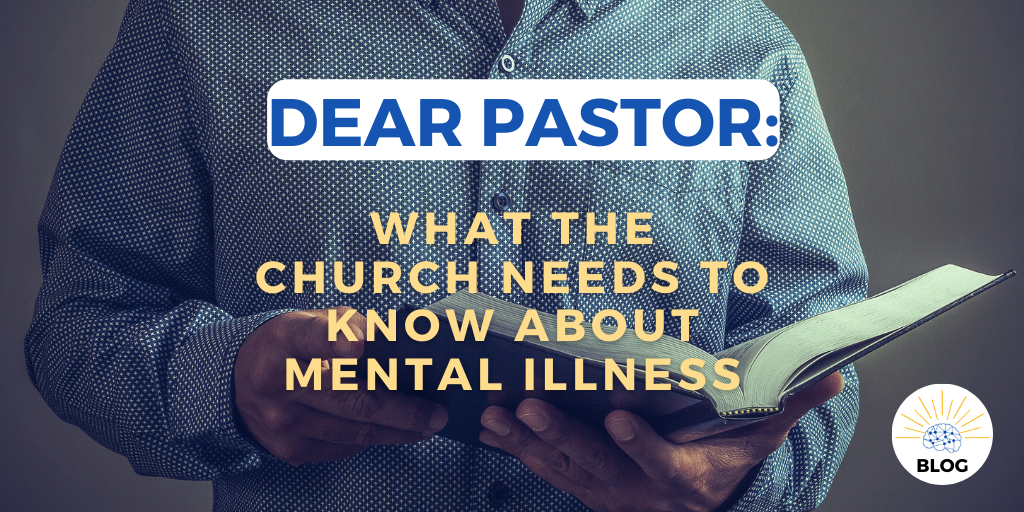Today I’m making a derivative out of an old blog post (Misconceptions Your Church May Have About Depression) and reworking it to address our pastors this month – it’s Pastor Appreciation Month.
Dear Pastor,
First and foremost, you are brave. Your calling is not easy or light. Drawing grit from your faith and convictions is a grit akin to what military forces draw upon. The required resilience that comes from committing to this calling is not glamorous or fiscally promising. The taxation on your spirit and soul your job exacts can be stretched thinner than your leather-worn Bible.
To put your job into words is a tall task. So many souls depend on your leadership and rely on your words as support. In hopes of making your job more manageable in the realm of the mental health of your congregation, here is an open letter I share with you. As someone who has long been attending church and active in service to nourish and be nourished, as someone who has been hurt and healed through the church, and as someone who holds on to hope in the face of the challenge to respond in healthy ways, I write to you.
When I write this message, I seek to encourage, edify, and point your shepherding expertise to the indiscriminating, loving way of our Good Shepherd. He goes out of his way to find the one lost, separated from the 99. Today, I hope you will follow him to that one, watching him work and join in with his efforts.
To that end, this generation today seems to be evolving into more chaos than enlightened reform and unity. I must acknowledge that if society is the report card of the church, the church is nowhere near acing the grade.
Here’s our chance to take back up the torch that guided the world through the Medieval ages into the Renaissance, toward ages of advancement in the sciences and arts, from revolutions to revivals. The precipice we are on is truly the final frontier – the mind. Is the church ready to capitalize on this chance to impact the world for Christ’s light to shine?
If we are ready, we need to acknowledge the fallacies, and then unite under the facts.
Fallacies First
The Bible doesn’t ordain psychiatric medications.
If mental illness is real, it would be in the Bible.
You should pray your way out of the depression and anxiety.
There is no magic pill. Work out your salvation “in fear and trembling.”
Anxiety is a sin. If you were to give it to God, you would be free.
Do you lean into this type of thinking? Are you tempted to side with the voices that diminish the reality of mental illness?
It can be hard to see the misconceptions, and distinguish the truth about mental illness in Christianity. If mental illness is real, you would wonder why it’s now beginning to be talked about and why this issue wasn’t addressed in past decades.
The short answer to that is, it was taboo. It didn’t fit into many pastors’ theologies. You wouldn’t talk about it because those who had psychiatric illnesses (especially those with anosognosia, “lack of insight”) were usually not in communion with others. Until the 1960s most of this population was institutionalized. The most dysfunctional church members may have had spurts of productivity in the church. People had issues and didn’t talk about them out of fear of stigma and shame. People had it and kept quiet because they assumed it wasn’t common, relevant, or appropriate. People fell blind to the anosognosia they had and weren’t enlightened to their situation.
We were living in the dark ages of mental health and illness awareness until recently. With the advent of newer psychotropics and evidence-based models of care and treatment, people like myself in an episode of pure manic psychosis no longer have to be a danger to ourselves to get access to care. Granted, the American mental healthcare system is a double-whammy to those who need the care, as if the illness itself weren’t enough. But there are paths to recovery. There is hope.
Cases such as Amy Simpson’s family who went through struggles and hoops to get help her pastor father needed for Amy’s mom — she discusses this in her book Troubled Minds. Pastors like our President and Chief Shepherd of Delight in Disorder, Tony Roberts, and Brad Hoefs of Fresh Hope for Mental Health, suffered silently until they couldn’t anymore. Their congregations redemptively led them to get help. My former pastor and speaker Sammy Lopez, boldly confessed to his depression and anxiety in sermons. But the ignorance permeating much of the church still lingers. We need hope, clarity, and truth to guide the sheep. Shepherds, you are in pivotal roles to impact the congregation and society at large. We need more admissions of brokenness from the pulpit – realness, authenticity, truth. Not less.
People need to stop putting you on pedestals to look up at, and need to put you on their prayer lists so you can be prayed for. Part of being transparent about your struggles is where God’s power rests. In 2 Corinthians 12:7-10, Paul harps on this.
We boast in our weaknesses so that God’s sufficient grace can showcase his power through our testimonies.
If those who come to church struggle at the same rate inside a church building as the general population struggles with these things outside, there’s still a lot of work cut out for us.
Not a God of Confusion
Confusion comes into the picture when we are ignorant of the grace of science and medicine, thinking there’s no place for it in our knowledge of God and the Bible. We panic and assign the dysfunction to a lack of holiness, a personal failure or shortcoming, a sin, or worse – demonic influence. The Bible left out a lot of things including the explicit mention of mental illness. Dinosaurs aren’t in the text per se, nor are a lot of realities in life.
But does the Bible actually leave it out?
Psalms. King David’s lamentations and anxieties. King Nebuchadnezzar’s dramatic animalistic behavior. Samson’s notorious passive-aggressive nature (Borderline Personality, anyone?). I could go on.
What about the illnesses that Jesus healed that aren’t specifically mentioned?
God supplies and provides in numerous ways – so those who can pray their way out of depression, God bless them.
If it’s a sin that is keeping a church member from loving Him with all their heart, of course repentance is an answer.
But if that depression and anxiety is plaguing their poor heart, soul, and mind, and you’re at a loss for the next step, it may be clinical. They may need medically necessary attention. Referring them to wisdom from a counselor, and a licensed physician or psychiatrist for treatment is a good first step.
Medicine is a Grace
God gave us medicine for a reason. Thank God He allows us to have medicine for the illnesses that impair our functioning.
Just as I tell others that to “choose joy” isn’t as easy as it sounds, there is a time to suffer and a time for joy. But to suffer under the weight of a medical, clinical and might I even add Biblical depression/mental illness, is something different than suffering for the sake of sharing the gospel and the life that is given to sacrificially serve Him.
Suffering and misery are two different things. Suffering for Christ’s sake is persecution as a byproduct of obedience and spreading the gospel. Misery in the more familiar form of mental illness is a sickness that costs a person’s sanity or well-being. The two are not the same.
They can both draw me closer to Jesus, and I can suffer for being obedient to Him in my mental illness and misery. I can find my Great Physician working through both. But to regard a mental illness as something spiritually-rooted is not the whole picture.
The emotional/mental is not the spiritual, just as the physical is not the spiritual. (And I’ll give you a thought to consider even further: that the emotional/mental is physically-based.)
The world is keen on the fight against stigma. Dear pastor, please, take advantage of the moment. Our work is to take the gospel and proclaim it to all…including a cup of water for the least of these.
Real Solutions
Let’s care for the least of these in the many ways, gifts, and talents God has given us. A few examples of actions we can take to start moving in the direction of healing and leadership:
- Let’s encourage those struggling with0 mental illness to find answers and get the help they need. Make connections with local trusted psychiatrists, Christian counselors, and refer those struggling their way.
- There’s a shortage of good psychiatrists and counselors out there. Let’s pray that God provides more, and raises up a generation of compassionate men and women ready to take the gospel to psych hospitals as a psychiatrist or med tech or peer support.
- Pray for help on the streets to meet and serve those homeless who need medicine for their mind as much as a roof over their head.
- Go to the jails and prisons to minister to those unjustly criminalized from a mental illness.
- Host support groups like Fresh Hope, and Grace Alliance, in church settings.
- Talk about it from the pulpit.
- Host a walkathon for suicide prevention.
- Start a care ministry to execute these ideas.
- Attend Church Mental Health Summit, which happens annually on October 10th each year (register through this link here)
I pray that you and other pastors and church leadership will join in the work the Lord is doing to drive this movement forward into the good future God has planned. You aren’t alone, and we need you.
Grace and peace to you,
-From a healed, hopeful church member







